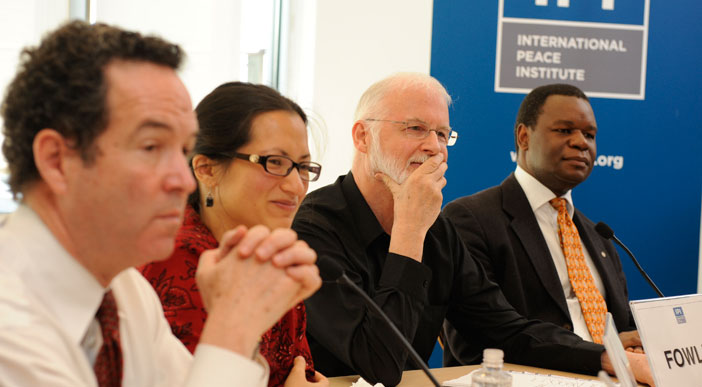
While refugees can stretch the capacities of hosting countries, their presence can also have beneficial effects.
An IPI seminar on May 4th focused on these effects and the experiences of refugee-hosting countries—a departure from the majority of research on refugees that explores the experiences of refugees themselves, or their repatriation and its effects on the country of origin.
As a few speakers at the seminar noted, refugees who receive appropriate training in exile can use those skills to help build peace when they return home. Yet they can also act as spoilers to peace if they are politicized while in exile, or if they are repatriated too early.
One presenter urged, “We must build on the benefits refugees can have. They can create markets… [spark] the development of infrastructure, and if they can work, contribute to the labor market.”
The seminar, co-hosted by IPI and the Pierre Elliott Trudeau Foundation, brought together over forty representatives from the Trudeau Foundation and IPI, diplomats, academics, and policy experts from the UN and NGO communities for the discussion, which also focused on the experiences of refugee-hosting countries; regional approaches to managing refugee returns and reintegration; and peacebuilding strategies to refugee situations.
The seminar was held under the Chatham House rule of nonattribution. A meeting report will be published by IPI in the next few months.
The seminar was preceded by an evening reception on May 3rd, which featured keynote remarks by Ambassador Martin Palouš of the Czech Republic on the nexus between refugee situations and peacebuilding.
In his remarks, Ambassador Palouš commended the progress the UN has made in recent years in developing peacebuilding strategies, but noted that more coordinated responses between and within different organizations would strengthen efforts to create sustainable peace in the midst of refugee situations.
![]() Download the meeting note
Download the meeting note
Speakers and Panelists
Opening Remarks:
Dr. Edward C. Luck, Senior Vice President for Research and Programs, International Peace Institute
Dr. Pierre-Gerlier Forest, President, The Pierre Elliott Trudeau Foundation
Panel I
Chair: Ambassador Robert Fowler, Former Permanent Representative of Canada to the United Nations, 2008 Trudeau Mentor
Panelists:
• Joel Charny, Vice President, Policy, Refugees International
• Sarah Kamal, The London School of Economics and Political Science, 2007 Trudeau Scholar
• Stanlake J.T.M. Samkange, Representative and Country Director, UN World Food Programme, Uganda Country Office
Panel II
Chair: Alex Neve, Secretary General of Amnesty International Canada, 2008 Trudeau Mentor
Panelists:
• Dr. James Milner, Carleton University, 2003 Trudeau Scholar
• Dr. Sarah Kenyon Lischer, Associate Professor of Political Science, Wake Forest University
• Dr. Jeff Crisp, Head of Policy Development and Evaluation, UNHCR (Geneva)
Panel III
Chair: Judy Cheng-Hopkins, Assistant Secretary-General for Peacebuilding Support, PBSO
Panelists:
• Udo Janz, Director, UNHCR (New York)
• Dr. Carolyn Makinson, Executive Director, Women’s Refugee Commission
• Stan Nkwain, Deputy Director of the Bureau for Crisis Prevention and Recovery, UNDP
Closing Session
Chairs:
Carolyn McAskie, Former Assistant Secretary-General for Peacebuilding Support, 2009 Trudeau Mentor
Dr. Edward C. Luck, Senior Vice President for Research and Programs, International Peace Institute







